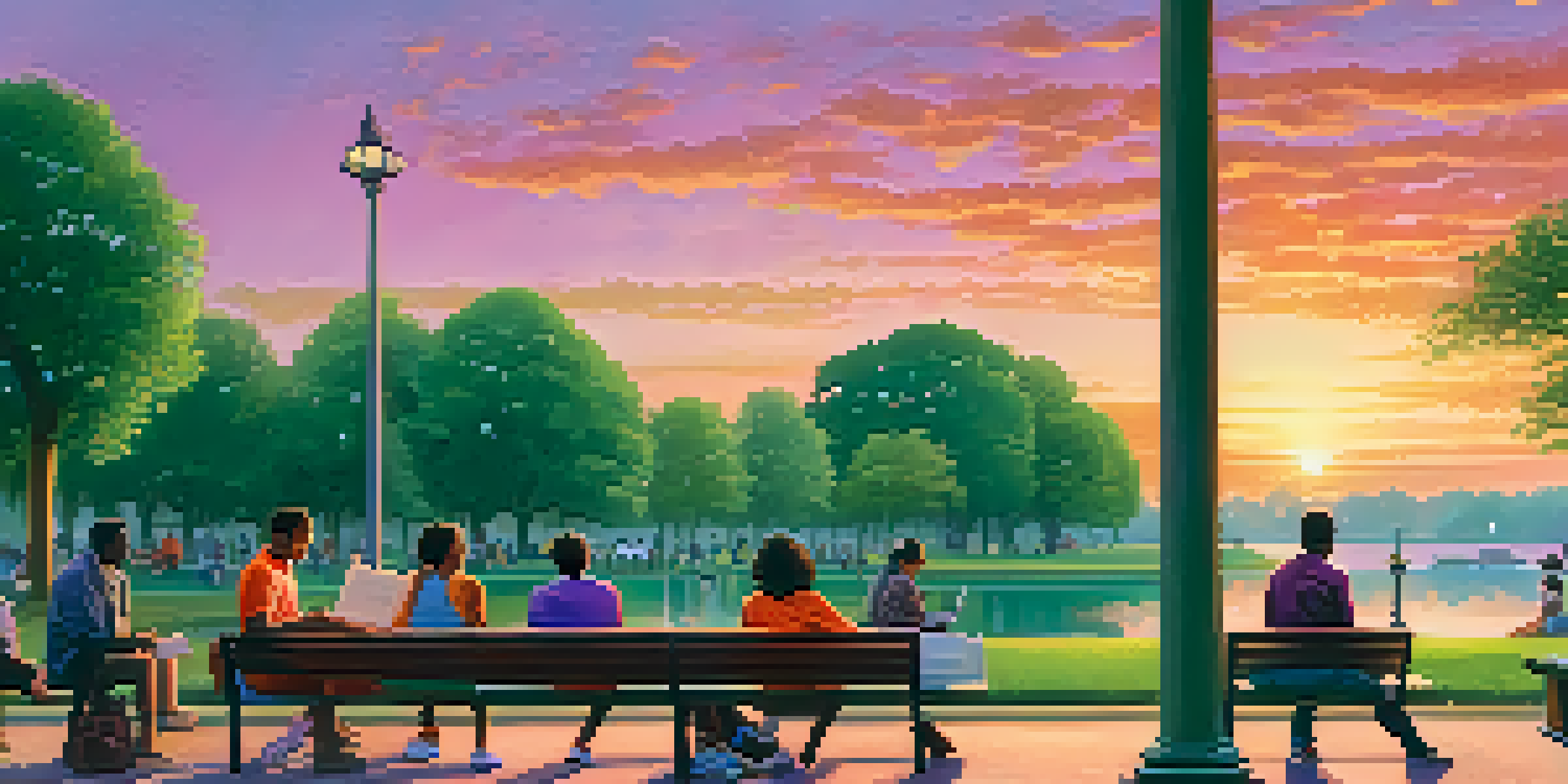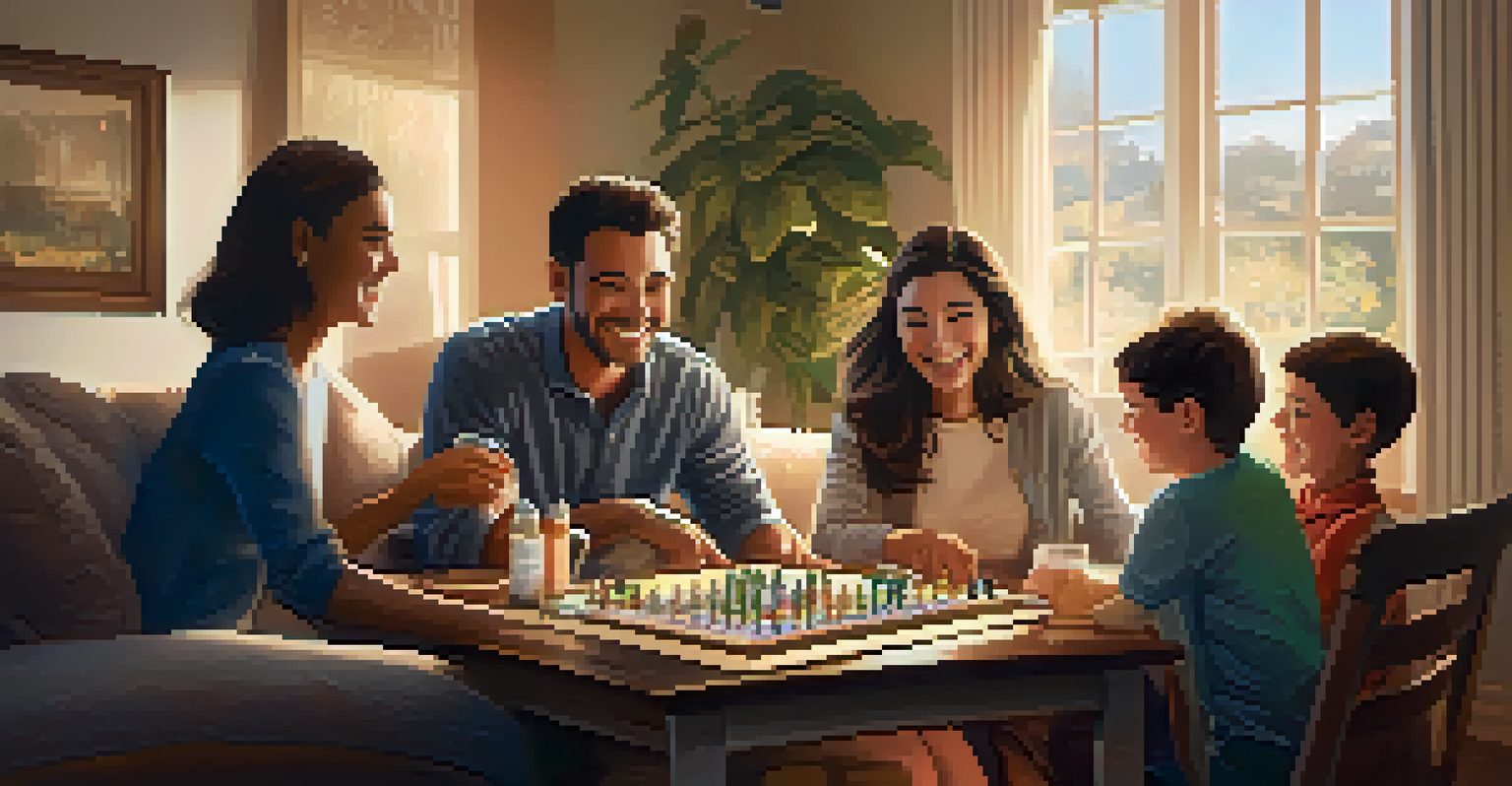The Dark Side of Social Networking: Addiction and Isolation

Understanding Social Media Addiction
Social media addiction is a growing concern, as many users find themselves glued to their screens for hours. This compulsive behavior often stems from the instant gratification that platforms provide, like likes and comments. Just like a sugar rush, the dopamine released during these interactions can create a cycle of craving more, leading to excessive use.
Technology is a double-edged sword. It can connect us, but it can also isolate us.
As this addiction develops, individuals may prioritize social media over real-life interactions, which can lead to feelings of emptiness. You might think of it as a virtual hug that never quite satisfies your emotional needs. Instead of fostering genuine connections, users often find themselves trapped in a loop of superficial engagement.
Recognizing social media addiction can be difficult, as it often masquerades as a harmless pastime. However, it can quickly spiral into a dependency that affects daily life, relationships, and overall well-being. Like any addiction, it requires awareness and intervention to break free from its hold.
The Isolation Paradox: More Connections, Less Intimacy
It’s ironic, but social networks designed to connect us can often lead to feelings of isolation. While you might have hundreds of 'friends,' these virtual ties can lack the depth of face-to-face relationships. Imagine being at a party surrounded by people but feeling utterly alone—this is the reality for many social media users.

The time spent scrolling through feeds can replace meaningful interactions, leaving individuals feeling disconnected from those physically around them. This phenomenon can create a sense of loneliness, as online interactions can feel less fulfilling than personal ones. Over time, this can contribute to a cycle of isolation that is hard to escape.
Social Media Addiction Affects Life
Excessive use of social media can lead to dependency, impacting daily life and real-life relationships.
To combat this paradox, it’s essential to prioritize real-world connections, even if it feels challenging at first. Setting boundaries with social media usage can help restore balance and create opportunities for deeper relationships. Ultimately, it’s about quality over quantity in our connections.
Impact on Mental Health: Anxiety and Depression
The constant comparison to others on social media can lead to increased anxiety and depression. Users often compare their lives to the carefully curated images and posts of their peers, creating unrealistic expectations. This can cultivate feelings of inadequacy and self-doubt, as one's life may seem less exciting in comparison.
The more we connect, the more we disconnect.
Moreover, the fear of missing out (FOMO) can exacerbate these feelings, leading many to feel pressured to stay online and engaged. This cycle can create a vicious cycle of anxiety, as users feel compelled to keep up with trends and their social circles. Over time, this can take a toll on mental well-being, making it difficult to find joy in offline activities.
Addressing these mental health impacts involves acknowledging and limiting exposure to negative influences online. Engaging in activities that promote self-esteem and mindfulness can help counteract these feelings. Remember, it’s okay to step back and focus on your own journey rather than get lost in the highlight reels of others.
The Role of Algorithms in Fueling Addiction
Social media platforms utilize complex algorithms designed to keep users engaged for as long as possible. These algorithms analyze user behavior and preferences, serving up content that is likely to draw you in. It’s like a personalized buffet of distractions that can be hard to resist, leading to extended hours spent online.
As users engage more, the algorithms become even more attuned to their interests, creating an echo chamber that reinforces existing beliefs and habits. This can limit exposure to diverse perspectives and contribute to a narrow worldview. The result? An even stronger grip on users, as they become more engrossed in the content that resonates with them.
Isolation in a Connected World
Despite having many online connections, users may feel more isolated due to the lack of depth in virtual interactions.
Understanding how these algorithms work can empower users to take control of their social media experience. By actively curating their feeds and recognizing when they’re being pulled in, individuals can create healthier online habits. It’s about regaining agency over the scroll and making conscious choices.
Digital Detox: Reclaiming Your Time and Mind
Engaging in a digital detox can be a refreshing way to break free from social media addiction. This practice involves stepping away from all screens for a designated period, allowing individuals to reconnect with the world around them. Think of it as hitting the reset button on your mental health and emotional well-being.
During a detox, users often discover how much time they were spending online, leading to surprising revelations about their habits. It’s an opportunity to explore hobbies, nurture relationships, and engage in activities that bring joy. Many report feeling more present and less overwhelmed after taking a break from the constant barrage of information.
To make a digital detox effective, set clear boundaries and find alternative activities to fill your time. Whether it’s reading a book, going for a walk, or spending quality time with loved ones, these moments can enrich your life in ways that scrolling never could. Ultimately, it’s about finding balance and prioritizing what truly matters.
Navigating Relationships in the Age of Social Media
Building and maintaining relationships in the digital age requires a mindful approach. While social media can help us stay connected, it’s essential to prioritize meaningful interactions. Consider scheduling regular catch-ups with friends and family, whether in-person or through video calls, to nurture those connections.
Additionally, being honest about your social media use with loved ones can help set expectations. Sharing your desire to spend less time online can lead to supportive conversations and shared goals. It’s important to communicate how you feel about social media’s impact on your relationships, fostering understanding and collaboration.
Finding Balance with Social Media
Setting intentional boundaries and curating your online experience can help maintain a healthier relationship with social media.
Remember, relationships thrive on authenticity and vulnerability. By being present and engaged in real life, you can create deeper, more fulfilling connections that withstand the test of time. Ultimately, it’s about blending the benefits of social media with the richness of face-to-face interactions.
Finding Balance: Healthy Social Media Use
Achieving a healthy balance with social media involves setting intentional boundaries. Start by defining how much time you want to spend on these platforms each day. Using tools like screen time trackers can provide valuable insights into your habits, making it easier to adjust as needed.
It’s also helpful to curate your online experience by unfollowing accounts that trigger negative feelings or comparisons. Instead, follow accounts that inspire and uplift you. This shift can transform your feed into a source of positivity, rather than a stressor, contributing to a healthier mindset.

Lastly, consider scheduling 'social media breaks' throughout your day, allowing yourself to step back and recharge. These moments of respite can help maintain a healthier relationship with technology, ensuring that it enriches your life rather than detracts from it. Balance is key to enjoying the benefits of social networking without falling prey to its darker side.